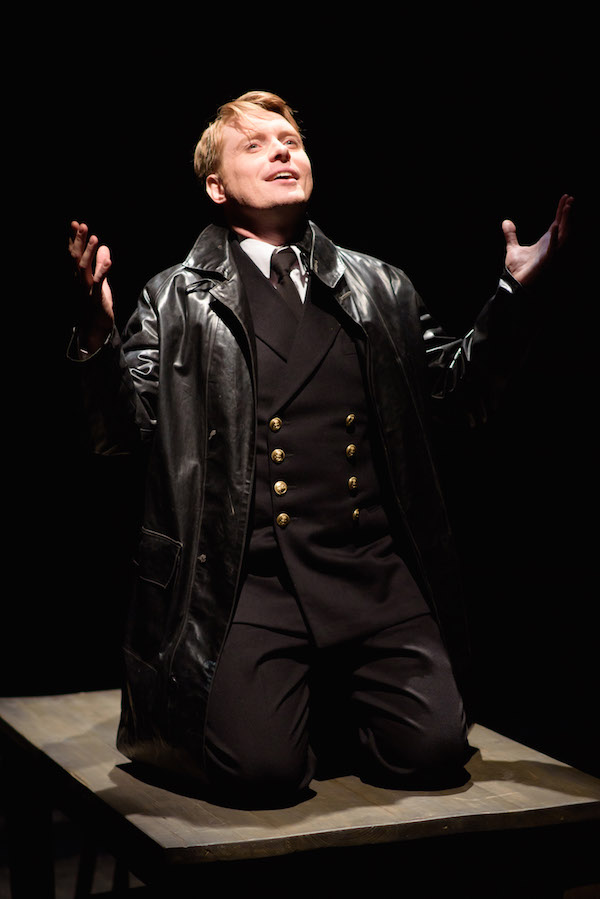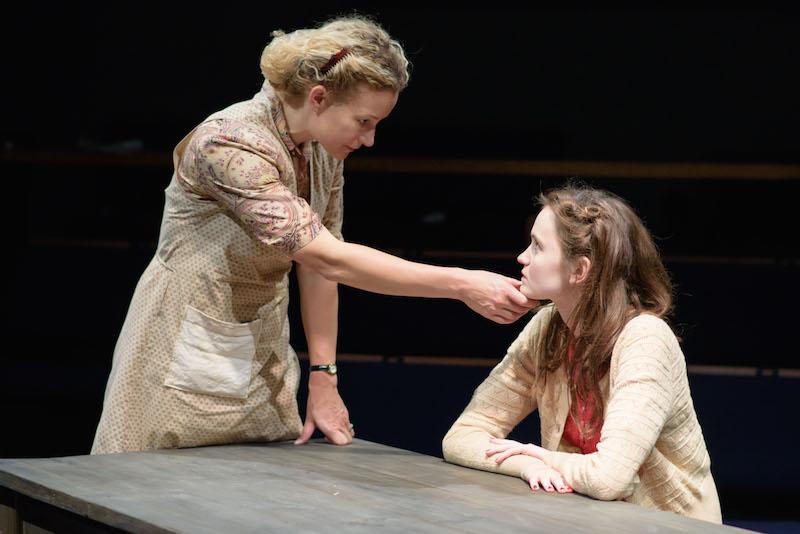Can you peg a whole play on a decent twist? When We Were Women’s narrative tease pays off interestingly, but takes a hell of a long time getting there. It leaves little space to explore the ramifications of an intriguing revelation, a frustration amplified by the constant chronological cross-cutting in this revived Sharman Macdonald work, first seen at the National in 1988.
In 1944, some terrible event has driven pregnant Isla (Abigail Lawrie) from the arms of sailor Mackenzie (Mark Edel-Hunt, pictured below), back to her aspirant working-class parents’ (Lorraine Pilkington and Steve Nicolson) Glasgow tenement. A year earlier, the romance headed for calamity gradually blossoms, from meet-cute to wedding bells. Neither Macdonald nor director Eleanor Rhode make a convincing case for this non-linear storytelling, which flirts awkwardly with formal experimentation. The result is narrative elliptical enough to disrupt the domestic naturalism and earnest intergenerational conflict, yet never truly radical. The time streams are tonally juxtaposed – one optimistic, looking to the future; another tinged with regret, examining the past – but any thematic resonance is unnecessary when the play so regularly and repetitively spells out its ideas. Precious little is trusted to subtext.
 The most engaging thread is a potential stand-alone monologue delivered by the charismatic Edel-Hunt. Mackenzie regularly addresses God as his reluctant wingman, discussing sexual exploits – which God’s already seen, the dirty voyeur – and explaining he can’t be a sinner when the Almighty keeps placing desirable women in his path. “Take me or leave me as I am,” he challenges, like a friend who’s always going to be 10 minutes late and is fed up apologising for it. But his roguish bargaining falters in the face of two hauntings: his brother, and a mysterious blonde (Sarah-Jayne Butler) presented like a noir femme fatale. Religion will also prove the barrier to his lasting happiness.
The most engaging thread is a potential stand-alone monologue delivered by the charismatic Edel-Hunt. Mackenzie regularly addresses God as his reluctant wingman, discussing sexual exploits – which God’s already seen, the dirty voyeur – and explaining he can’t be a sinner when the Almighty keeps placing desirable women in his path. “Take me or leave me as I am,” he challenges, like a friend who’s always going to be 10 minutes late and is fed up apologising for it. But his roguish bargaining falters in the face of two hauntings: his brother, and a mysterious blonde (Sarah-Jayne Butler) presented like a noir femme fatale. Religion will also prove the barrier to his lasting happiness.
There’s more straightforward treatment elsewhere, with father Alec praising his virginal daughter for gifting “goodness” to her husband; Isla attempting to wash away sin (overly literal but poignantly played by Lawrie); mother Maggie begging God to return her sons, one in a German POW camp, and ascribing war to divine judgement; and a pervasive sense of shame, perpetuated by the churchgoing neighbours, that particularly affects the tale’s women.
Is this meant to galvanise a contemporary audience? Yes, the sexual mores are bleak, but nostalgia softens them, and short scenes limit our visceral connection. Pilkinson is best demonstrating Maggie’s indomitable spirit, as when fiercely claiming a right to buy on the “rich” people’s black market. Nicolson’s boozer Alec offers reliable comic relief, though his wandering accent distracts, while Lawrie, making an assured stage debut, brings brittle vulnerability to Isla. James Turner provides a striking cracked granite floor lit from below, suggesting the past bubbling up or the fires of hell, and there’s effective use of period music, but ultimately this is a long way to go for scant return.















Add comment